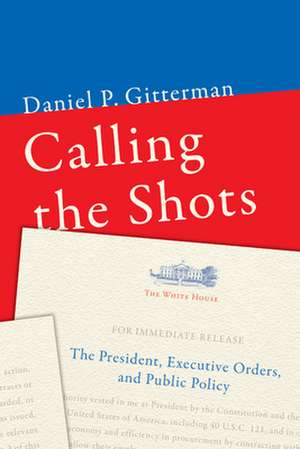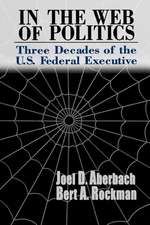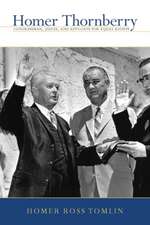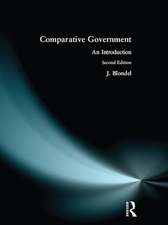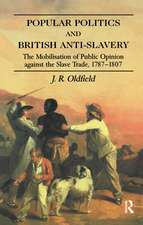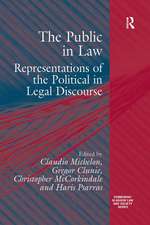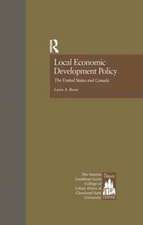Calling the Shots: The President, Executive Orders, and Public Policy
Autor Daniel P. Gittermanen Limba Engleză Paperback – 25 oct 2016
Modern presidents are CEOs with broad powers over the federal government.
The United States Constitution lays out three hypothetically equal branches of government—the executive, the legislative, and the judicial—but over the years, the president, as head of the executive branch, has emerged as the usually dominant political and administrative force at the federal level. In fact, Daniel Gitterman tells us, the president is, effectively, the CEO of an enormous federal bureaucracy.
Using the unique legal authority delegated by thousands of laws, the ability to issue executive orders, and the capacity to shape how federal agencies write and enforce rules, the president calls the shots as to how the government is run on a daily basis. Modern presidents have, for example, used the power of the purchaser to require federal contractors to pay a minimum wage and to prohibit contracting with companies and contractors that knowingly employ unauthorized alien workers.
Presidents and their staffs use specific tools, including executive orders and memoranda to agency heads, as instruments of control and influence over the government and the private sector. For more than a century, they have used these tools without violating the separation of powers. Calling the Shots demonstrates how each of these executive powers is a powerful weapon of coercion and redistribution in the president's political and policymaking arsenal.
The United States Constitution lays out three hypothetically equal branches of government—the executive, the legislative, and the judicial—but over the years, the president, as head of the executive branch, has emerged as the usually dominant political and administrative force at the federal level. In fact, Daniel Gitterman tells us, the president is, effectively, the CEO of an enormous federal bureaucracy.
Using the unique legal authority delegated by thousands of laws, the ability to issue executive orders, and the capacity to shape how federal agencies write and enforce rules, the president calls the shots as to how the government is run on a daily basis. Modern presidents have, for example, used the power of the purchaser to require federal contractors to pay a minimum wage and to prohibit contracting with companies and contractors that knowingly employ unauthorized alien workers.
Presidents and their staffs use specific tools, including executive orders and memoranda to agency heads, as instruments of control and influence over the government and the private sector. For more than a century, they have used these tools without violating the separation of powers. Calling the Shots demonstrates how each of these executive powers is a powerful weapon of coercion and redistribution in the president's political and policymaking arsenal.
Preț: 271.08 lei
Nou
Puncte Express: 407
Preț estimativ în valută:
51.87€ • 55.47$ • 43.25£
51.87€ • 55.47$ • 43.25£
Carte tipărită la comandă
Livrare economică 17 aprilie-01 mai
Preluare comenzi: 021 569.72.76
Specificații
ISBN-13: 9780815729020
ISBN-10: 0815729022
Pagini: 200
Dimensiuni: 152 x 229 x 23 mm
Greutate: 0.48 kg
Editura: Brookings Institution Press
Colecția Brookings Institution Press
ISBN-10: 0815729022
Pagini: 200
Dimensiuni: 152 x 229 x 23 mm
Greutate: 0.48 kg
Editura: Brookings Institution Press
Colecția Brookings Institution Press
Notă biografică
Daniel P. Gitterman holds the Thomas Willis Lambeth Distinguished Chair in Public Policy at the University of North Carolina at Chapel Hill. Gitterman’s research interests include the American presidency and public policy, and American politics of social policy. His book, Boosting Paychecks: The Politics of Supporting America’s Working Poor, published by Brookings Institution Press, examines the role of federal income tax and minimum wage in supporting low-income working families in the United States.
Textul de pe ultima copertă
Modern presidents are CEOs with broad powers over the federal government
While the U.S. Constitution establishes three branches of governmentthe executive, the legislative, and the judicialthe executive branch as embodied in the president has emerged over the years as the dominant political and administrative force at the federal level. In fact, Daniel Gitterman tells us, the president is the de facto CEO of an enormous federal bureaucracy.
The federal government is the single biggest purchaser of goods and services in the U.S. economy. It is also an employer of more than three million workers. The president, as chief executive, sits on top of all this.
With the authority to issue executive orders and the capacity to shape how federal agencies write and enforce rules, the president controls how the government implements and changes policy every day. Modern presidents have, for example, been able to require federal contractors to pay a minimum wage, to prohibit human trafficking, and to encourage environmental sustainability.
For more than a century, presidents have put to use the tools at their disposal to bring about policy shifts without violating the separation of powers. Calling the Shots demonstrates how executive power is a powerful weapon of coercion and redistribution in the president s political and policymaking arsenal."
While the U.S. Constitution establishes three branches of governmentthe executive, the legislative, and the judicialthe executive branch as embodied in the president has emerged over the years as the dominant political and administrative force at the federal level. In fact, Daniel Gitterman tells us, the president is the de facto CEO of an enormous federal bureaucracy.
The federal government is the single biggest purchaser of goods and services in the U.S. economy. It is also an employer of more than three million workers. The president, as chief executive, sits on top of all this.
With the authority to issue executive orders and the capacity to shape how federal agencies write and enforce rules, the president controls how the government implements and changes policy every day. Modern presidents have, for example, been able to require federal contractors to pay a minimum wage, to prohibit human trafficking, and to encourage environmental sustainability.
For more than a century, presidents have put to use the tools at their disposal to bring about policy shifts without violating the separation of powers. Calling the Shots demonstrates how executive power is a powerful weapon of coercion and redistribution in the president s political and policymaking arsenal."
